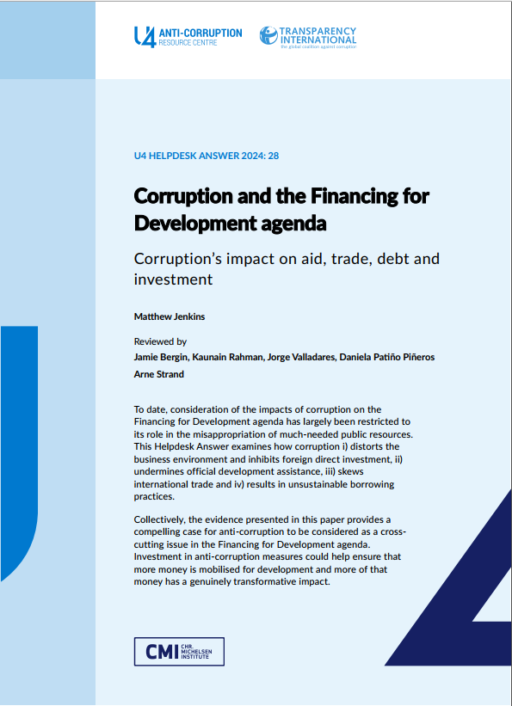
This Anti-Corruption Helpdesk brief was produced in response to a query from a U4 Partner Agency. The U4 Helpdesk is operated by Transparency International in collaboration with the U4 Anti-Corruption Resource Centre based at the Chr. Michelsen Institute.
Query
Please provide an overview of why anti-corruption efforts matter to the Financing for Development agenda, with a particular focus on domestic and international private business, international development cooperation, international trade, and debt sustainability.
Summary
To date, consideration of the impacts of corruption on the Financing for Development agenda has largely been restricted to its role in the misappropriation of much-needed public resources. This Helpdesk Answer examines how corruption i) distorts the business environment and inhibits foreign direct investment, ii) undermines official development assistance, iii) skews international trade and iv) results in unsustainable borrowing practices.
Collectively, the evidence presented in this paper provides a compelling case for anti-corruption to be considered as a cross-cutting issue in the Financing for Development agenda. Investment in anti-corruption measures could help ensure that more money is mobilised for development and more of that money has a genuinely transformative impact.
Main points
- As acknowledged in successive Financing for Sustainable Development Reports, corruption continues to be an important drain on the key source of finance for development: the mobilisation, management and disbursement of domestic public resources.
- However, corruption reduces the potential positive impact of four other sources of financing for development, where – to date – corruption has received far less attention in the Financing for Development agenda: private sector investment, official development assistance, international trade and sovereign debt.
- There is a large and growing body of evidence that demonstrates how corruption harms economic growth, distorts the business environment, impedes firm productivity and competitiveness, obstructs foreign direct investment, and undermines the potentially transformative effects of impact investing.
- A review of the literature underscores how corrupt practices undercut the intended impact of official development assistance at every stage, from elite capture and aid diversion through to fraud at the level of service delivery.
- Corruption has a deleterious effect on the potential of international trade to act as an “engine of development”, by reduces tax revenue from customs, constraining the volume of international trade and skewing trade policy towards special interest groups. In addition, corruption often plays an enabling role in illicit trade in timber, fish, wildlife and other natural resources, as well as narcotics, tobacco products, counterfeit goods and human trafficking.
- Corruption contributes to unsustainable borrowing practices as corrupt officials prioritise short-term private interests over the longer-term public interest, which can contribute to sovereign debt crises. Furthermore, the opacity of many debt financing arrangements may also create further vulnerabilities to corruption and abuse of funds.
- Collectively, this evidence illustrates that corruption can be usefully understood as a cross-cutting issue across the whole Financing for Development agenda. Indeed, this literature review suggests that domestic public resources cannot be fully shielded from corrupt abuses unless integrity risks relating to private investment, development assistance, international trade and opaque debt are addressed.
- Investment in anti-corruption measures could help ensure that more money is mobilised for development initiatives and more of that money reaches people and places where it can have a genuinely transformative positive impact.
Contents
- Background
- Corruption's effect on the business environment and investment climate
- Corruption's effect on international development cooperation
- Corruption's effect on international trade
- Corruption's effect on debt sustainability
Caveat
There are clear “connections between [development] finance, trade and investments, debt, and financial flows from the private sector” (Saldinger 2024), which combine to produce a complex, interwoven picture of financing for sustainable development. Despite their entwined nature, the Addis Ababa Action Agenda (AAAA) treats these issues as distinct Action Areas. As such, this Helpdesk Answer adopts the same approach.
This Helpdesk Answer draws extensively on previous work written by the same author (Jenkins 2018b, 2016a, 2024a, 2016b, 2022, 2018a, 2024b).
Authors
Matthew Jenkins
Reviewers
Jamie Bergin, Kaunain Rahman, Jorge Valladares, Daniela Patiño Piñeros - Transparency International
Arne Strand - U4 Anti-Corruption Resource Centre
Date
17/06/2024
Tags
 Download PDF
Download PDF
